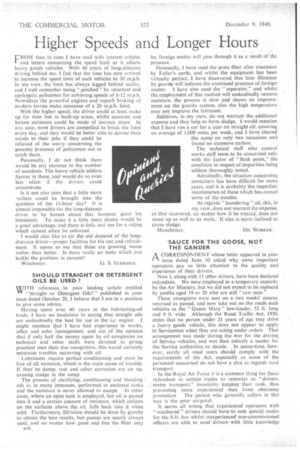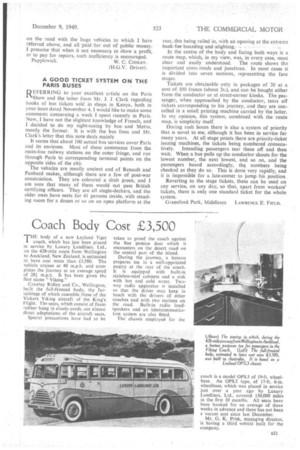Higher Speeds and Longer Hours
Page 52

Page 55

If you've noticed an error in this article please click here to report it so we can fix it.
FROM time to time 1 have read with interest articles aad letters concerning the speed limit as it affects heavy goods vehicles. With 40 years of long-distance driving behind me, 1 feel that the time has now arrived to increase the speed limit of such vehicles to 30 m.p.h. In my view, the limit has always lagged behind reality. and I well remember being " pinched " by reluctant and apologetic policemen for achieving speeds of 8-12 m.p.h. Nowadays the powerful engines and superb braking of modern lorries make nonsense of a 20 m.p_h. limit.
With the higher speed, the driver could at least make up for time lost in built-up areas, whilst accurate and honest estimates could be made of journey times. In any case, most drivers are compelled to break the limit every day, and they would be better able to devote their minds to their jobs if they could be relieved of the worry concerning the possible presence of policemen out to catch them.
Personally, I do not think there would be any increase in the number of accidents The heavy.vehicle seldom figures in these, and would do so even less often if the drivers could concentrate.
Is it not also time that a little more -ealism could be brought into the question of the 11-hour day? It is almost impossible for the long-distance driver to be honest about this, however good his intentions To make it a little more elastic would be a great advantage, and there is little real use for a railing which cannot often be enforced.
I would also like to air the old demand of the longdistance driver—proper facilities for his rest and refreshment. It seems to me that these are -growing worse rather than better. Is there really no body which can tackle the problem in earnest? .
Winchester. G. S. ELDRIDGE.
SHOULD STRAIGHT OR DETERGENT OILS BE USED?
WITH reference to your leading article entitled " "Straight or Detergent Oils?" published in your issue dated October 28, I believe that I am in a position to give some advice.
Having spent over 40 years in the lubricating-oil trade. I have no hesitation in saying that straight oils are undoubtedly the best for use in the Lc. engine. might mention ttiat 'I have had experience in works, office and sales management, and am of the opinion that if only half the money spent by oil companies on technical and other staffs were devoted to giving practical men their due recognition, this would certainly minimize troubles occurring with oil.
Lubricants require perfect conditioning and must be free of all moisture, which is the main cause of trouble. If they be damp, rust and other corrosion are set up, causing sludge in the sump.
The process of clarifying, conditioning and blending oils is, in many instances, performed in enclosed tanks and the moisture is never allowed to escape. In other cases, where an open tank is employed, hot oil is passed into it and a certain amount of moisture, which collects on the surfaces above the oil, falls back into it when cold. Furthermore, filtration should be done by gravity to obtain the best results, but pumps are nearly always used, and no matter how good and fine the filter may be, foreign matter will pass through it as a result of the pressure.
Personally, 1 have used the press filter after treatment by Fuller's earth, and whilst the equipment has been virtually perfect. I have discovered that later filtration by gravitky will indicate the continued presence of foreign matter. I have also used the "separator," and whilst the employment of this method will undoubtedly remove moisture, the process is slow and shows no improvement on the gravity system, also the high temperature may not improve the lubricant.
Additives, in my view, do not warrant the additional
expense and they help to form sludge. I would mention that I have run a car for a year on straight oil, covering•
an average of 1,000 miles per week, and I have cleared the sump on only two occasions and found no excessive carbon.
The technical staff who control works staff seem to be concerned only with the factor of "flash point," the condition in respect of impurities being seldom thoroughly tested.
Admittedly, the situation concerning containers has been difficult for some years, and it is probably the imperfeet maintenance of these which has caused some of the trouble.
As regards " laundering " oil, this, in my view, does not warrant the expense, as that recovered, no matter how it be treated, does not stand up so well to its work. It also is more inclined to cause sludge.
Manchester. OIL WORKER.
-SAUCE FOR THE GOOSE, NOT THE GANDER A CORRESPONDENT whose letter appeared in your " issue dated June 10 asked why some important .operators pay so little attention to the quality and experience of their drivers.
Now 1, along with 11 other drivers, have been declared redundant. We were employed in a temporary capacity by the Air Ministry, but we did not expect to be replaced by youths aged 19 or 20 who are still " raw men."
These youngsters were sent on a two weeks' course, returned as passed, and now take out on the roads such vehicles as the "Queen Mary" low-loader, 52 ft. long and 9 ft.. wide Although the Road Traffic Act, 1930, states that no person under 21 years of age may drive a heavy goods vehicle, this .does not appear to apply to Servicemen when they are acting under orders That arrangement was made during the war for the driving of Service vehicles, and was then entirely a matter for the Service authorities to decide. In peace-time, however, surely all road users should comply with the requirements of the Act, especially as some of the personnel concerned do not have a clue as regards road transport.
In the Royal Air Force it is a common thing for those redundant in certain trades to remuster as "drivers, motor transport." invariably keeping -their rank, thus preventing more experienced men from obtaining promotion. The person who generally suffers in this way is the poor corporal.
It seems all wrong that experienced operators with " weathered " drivers should have' to seek special routes for the 8-ft. bus whilst inexperienced non-commissioned officers are able to send drivers with little knowledge on the road with the huge vehicles to which I have referred above, and all -paid 'for out of public money. I presume that when it not necessary to show a profit, or to pay for repairs, such inefficiency is encouraged.
Papplewick. W. C. CONLEY.
(1-1.G.V. Driver).
A GOOD TICKET SYSTEM ON THE PARIS BUSES p EFERRING to your excellent article on the Paris "Show and the letter from Mr. J. J. Clark regarding books of bus tickets sold in shops in Kenya, both in your issue dated November 4, I would like to make some comments concerning a week I spent recently in Paris. Now, I have not the slightest knowledge of French, and I decided to do my sight-seeing by bus. and Metro, mostly the former. It is with the bus lines and Mr. Clark's letter that this note deals mainly It seems that about 100 actual bus services cover Paris and its environs. Most of these commence from the main-line railway stations on the outer fringe, and run through Paris to corresponding terminal points on the opposite sides of the city.
The vehicles are mostly ancient and of Renault and Panhard makes, although there are a few of post-war construction. They are coloured a drab green, and I am sure that many of them would not pass British certifying officers. They are all single-deckers, and the older ones have seats for 41 persons inside, with standing room for a dozen or so on an open platform at the
rear, this being railed in, with an opening at the extreme bacic for boarding and alighting, •• In the centre of the body and facing both ways is a route map, which, in my view, was, in every case, most clear and easily understood. The route shows the important cross.roads and junctions. In most cases it is divided into seven sections, representing the fare stages.
Tickets are obtainable only in packages of 20 at a cost of 190 francs (about 2s.), and can be bought either from the conductor or at street-corner kiosks. The passenger, when approached by the conductor, tears off tickets corresponding to his journey, and they are cancelled in a small printing machine carried by the latter. In my opinion, this system, combined with the route map, is simplicity itself.
During rush hours there is also a system of priority that is novel to me, although it has been in service for many years. At all stage points there are priority-ticket issuing machines, the tickets being numbered consecutively. Intending passengers tear these off and then wait. When a bus pulls up the conductor shouts for the lowest number, the next lowest, and so on, and the passengers board accordingly, thq numbers being checked as they do so. This is done very rapidly, and it is impossible for a late-comer to jump his position.
Reverting to the stage tickets, these can be used on any service, on any day, so that, apart from workers' tickets, there is only one standard ticket for the whole system.
Greenford Park, Middlesex LAWRENCE E. FIELD.




























































































